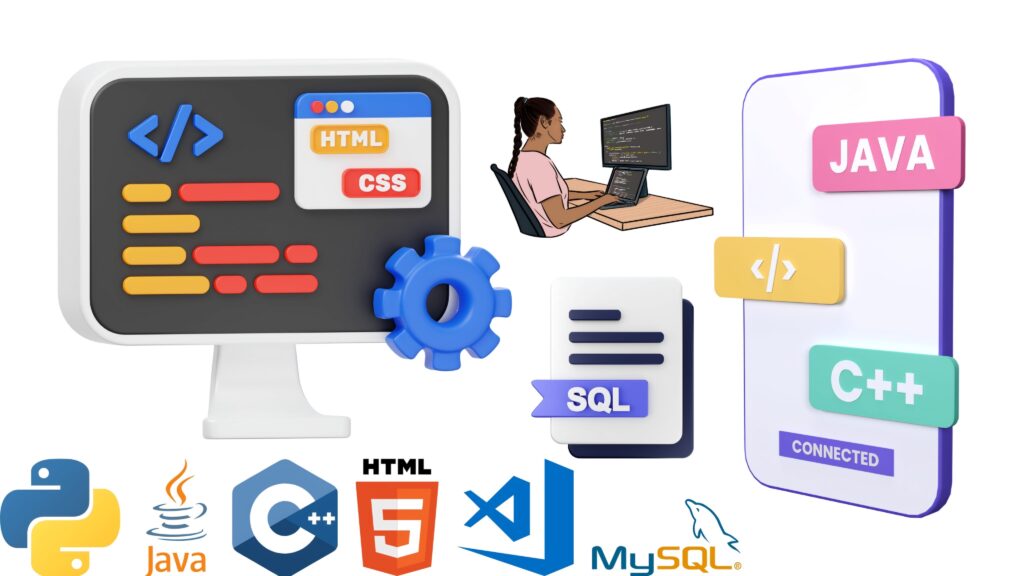The world of technology is ever-evolving, and programming languages are at the heart of software development. As we move into 2024, several programming languages are standing out as particularly valuable for developers, both new and experienced. Whether you’re looking to break into the tech industry, advance your current career, or simply expand your skill set, mastering these languages can give you a significant edge. In this blog, we’ll explore the top programming languages to learn in 2024: Python, JavaScript, SQL, Go, Rust, Java, C and C++, C#, and Swift. We’ll also discuss the key points to easily understand each language and what you need to learn them effectively.

1. Python
Why Learn Python?
Python is renowned for its simplicity and readability, making it an excellent choice for beginners. It’s widely used in web development, data analysis, artificial intelligence, scientific computing, and more. Its extensive standard library and supportive community make it a versatile and powerful language.
Key Points to Understand Python:
- Syntax: Python uses indentation to define code blocks, which enhances readability.
- Libraries & Frameworks: Familiarize yourself with libraries like Pandas, NumPy, and frameworks like Django and Flask.
- Community Support: Leverage forums, documentation, and online courses for help.
How to Learn Python:
- Online Courses: Platforms like Coursera, edX, and Udacity offer comprehensive Python courses.
- Practice Projects: Start with simple projects like a calculator or a to-do list app and gradually move to more complex ones.
- Books: “Automate the Boring Stuff with Python” by Al Sweigart is a great starting point.
2. JavaScript
Why Learn JavaScript?
JavaScript is the backbone of web development, enabling dynamic and interactive web pages. It’s also used in server-side development (Node.js), mobile app development, and even game development.
Key Points to Understand JavaScript:
- Syntax and DOM Manipulation: Understand the basic syntax and how to manipulate the Document Object Model (DOM).
- Asynchronous Programming: Learn about callbacks, promises, and async/await.
- Frameworks and Libraries: Get familiar with React, Angular, and Vue.js.
How to Learn JavaScript:
- Interactive Tutorials: Websites like Codecademy and freeCodeCamp offer interactive JavaScript tutorials.
- Project-Based Learning: Build small web applications like a weather app or a simple game.
- Books: “Eloquent JavaScript” by Marijn Haverbeke is a highly recommended read.
3. SQL
Why Learn SQL?
SQL (Structured Query Language) is essential for database management. It’s used to query, update, and manage data in relational databases, making it indispensable for data analysis and backend development.
Key Points to Understand SQL:
- Basic Queries: Learn the fundamental SQL commands like SELECT, INSERT, UPDATE, and DELETE.
- Database Design: Understand the principles of database normalization and relationships.
- Advanced Queries: Get comfortable with JOINs, subqueries, and stored procedures.
How to Learn SQL:
- Online Courses: Sites like Khan Academy and SQLZoo offer excellent SQL tutorials.
- Practice Exercises: Use platforms like LeetCode and HackerRank to practice SQL queries.
- Books: “SQL in 10 Minutes, Sams Teach Yourself” by Ben Forta is a great beginner’s guide.
4. Go (Golang)
Why Learn Go?
Go, also known as Golang, is designed by Google and known for its simplicity, efficiency, and strong performance. It’s particularly popular for cloud services, distributed systems, and backend development.
Key Points to Understand Go:
- Concurrency: Learn about goroutines and channels for concurrent programming.
- Standard Library: Get familiar with Go’s powerful standard library.
- Simplicity: Embrace Go’s minimalist syntax and straightforward approach to problem-solving.
How to Learn Go:
- Online Tutorials: Websites like Go.dev and Golang.org offer official tutorials and resources.
- Open Source Projects: Contribute to open-source Go projects to gain practical experience.
- Books: “The Go Programming Language” by Alan A. A. Donovan and Brian W. Kernighan is an excellent resource.
5. Rust
Why Learn Rust?
Rust is praised for its performance and memory safety, making it ideal for system programming and applications requiring high reliability. It’s gaining traction in web development, game development, and operating systems.
Key Points to Understand Rust:
- Ownership and Borrowing: Master Rust’s unique memory management model.
- Concurrency: Leverage Rust’s safe concurrency features.
- Tooling: Familiarize yourself with Cargo, Rust’s package manager and build system.
How to Learn Rust:
- Official Documentation: Start with the Rust Book, available for free on the Rust website.
- Community: Engage with the Rust community through forums and Discord channels.
- Books: “Programming Rust” by Jim Blandy and Jason Orendorff is highly recommended.
6. Java
Why Learn Java?
Java is a versatile, object-oriented language widely used in enterprise environments, Android app development, and large-scale systems. Its platform independence and robust performance make it a staple in the tech industry.
Key Points to Understand Java:
- Object-Oriented Programming (OOP): Understand Java’s OOP principles, including classes, inheritance, and polymorphism.
- Java APIs: Familiarize yourself with core APIs like Java Collections and Java IO.
- Frameworks: Learn popular frameworks like Spring and Hibernate.
How to Learn Java:
- Online Courses: Websites like Coursera and Udacity offer comprehensive Java courses.
- Hands-On Practice: Build projects like a simple banking system or a chat application.
- Books: “Effective Java” by Joshua Bloch is a must-read for Java developers.
7. C and C++
Why Learn C and C++?
C and C++ are foundational languages in computer science. C is known for its simplicity and performance, while C++ offers object-oriented features. They are used in system programming, game development, and performance-critical applications.
Key Points to Understand C and C++:
- Memory Management: Learn about pointers, dynamic memory allocation, and deallocation.
- OOP in C++: Understand classes, inheritance, and polymorphism in C++.
- STL (Standard Template Library): Get familiar with C++’s powerful STL.
How to Learn C and C++:
- Online Tutorials: Websites like Learn-C.org and LearnCpp.com offer interactive tutorials.
- Practice Problems: Use coding platforms like Codeforces and HackerRank to practice.
- Books: “The C Programming Language” by Brian W. Kernighan and Dennis M. Ritchie and “C++ Primer” by Stanley B. Lippman are excellent resources.
8. C#
Why Learn C#?
C# is developed by Microsoft and is a key language for Windows application development and game development using the Unity engine. It’s also used in enterprise software and web applications.
Key Points to Understand C#:
- OOP Principles: Understand C#’s object-oriented features.
- .NET Framework: Get familiar with the .NET framework and its libraries.
- Asynchronous Programming: Learn about async and await for handling asynchronous operations.
How to Learn C#:
- Online Courses: Websites like Pluralsight and Microsoft Learn offer excellent C# tutorials.
- Unity Projects: Build simple games or applications using the Unity engine.
- Books: “C# 8.0 and .NET Core 3.0” by Mark J. Price is a comprehensive guide.
9. Swift
Why Learn Swift?
Swift is Apple’s programming language for iOS and macOS development. It’s designed to be safe, fast, and expressive, making it a great choice for building apps for Apple devices.
Key Points to Understand Swift:
- Syntax and Safety: Swift’s syntax is concise and expressive, with safety features to avoid common programming errors.
- iOS Development: Learn about UIKit and SwiftUI for building user interfaces.
- Xcode: Get comfortable with Xcode, Apple’s integrated development environment (IDE).
How to Learn Swift:
- Apple’s Resources: Use Apple’s official Swift documentation and tutorials.
- iOS Projects: Start with simple apps like a calculator or a notes app and gradually move to more complex projects.
- Books: “Swift Programming: The Big Nerd Ranch Guide” by Matthew Mathias and John Gallagher is highly recommended.
What You Need to Learn All These Languages
Tools and Resources:
- Integrated Development Environment (IDE): Use appropriate IDEs like PyCharm for Python, Visual Studio Code for JavaScript, IntelliJ IDEA for Java, and Xcode for Swift.
- Version Control: Learn Git and GitHub for version control and collaboration.
- Online Communities: Join forums, Discord channels, and Reddit communities related to each language.
Learning Approach:
- Set Clear Goals: Define what you want to achieve with each language.
- Practice Regularly: Consistent practice is key to mastering programming languages.
- Build Projects: Apply what you learn by building real-world projects.
- Seek Feedback: Participate in code reviews and seek feedback from more experienced developers.
Mindset:
- Be Patient: Learning programming takes time and effort. Be patient and persistent.
- Embrace Challenges: Don’t be afraid to tackle challenging problems. They are great learning opportunities.
- Stay Curious: Keep exploring new concepts and technologies to stay updated.
By focusing on these top programming languages and following a structured learning approach, you can equip yourself with valuable skills that are in high demand in 2024 and beyond. Happy coding!
Learning to code can be a valuable skill, but if you’re looking for AI tools that can help you achieve your goals without needing to dive deep into programming, you’re in luck. Here are some of the best AI tools that can assist you in utilizing the top programming languages for 2024, without the need to learn coding extensively:
- GitHub Copilot:
- Best For: Python, JavaScript, SQL, Go, Rust, Java, C, C++, C#, Swift
- Description: GitHub Copilot is an AI-powered code completion tool that suggests whole lines or blocks of code as you type. It works with a variety of programming languages and can help you write code faster and more efficiently.
- OpenAI Codex:
- Best For: Python, JavaScript, Go, Rust, Java, C, C++, C#
- Description: Built on the same model as GPT-3, OpenAI Codex can translate natural language into code. It supports many languages and can help you generate code snippets, complete functions, and even build entire applications based on your descriptions.
- Tabnine:
- Best For: Python, JavaScript, Java, C, C++, C#, Swift
- Description: Tabnine is an AI code completion tool that integrates with popular IDEs. It uses machine learning to predict and suggest code completions, making coding faster and more efficient.
- Replit:
- Best For: Python, JavaScript, Java, C, C++, C#
- Description: Replit is an online coding platform that offers collaborative coding environments. It also includes an AI assistant that can help generate and debug code, making it easier for non-coders to create and manage projects.
- Kite:
- Best For: Python, JavaScript, Go, Java
- Description: Kite is an AI-powered coding assistant that integrates with various code editors. It offers code completions, documentation, and error explanations to help streamline the coding process.
- DeepCode:
- Best For: Python, JavaScript, Java, C, C++, C#
- Description: DeepCode is an AI-based code review tool that scans your code for bugs, security issues, and performance problems. It supports multiple languages and provides intelligent suggestions for improvements.
- CodeT5:
- Best For: Python, JavaScript, Go, Rust, Java, C, C++, C#
- Description: CodeT5 is a transformer-based model for code generation and understanding. It can help with code completion, summarization, and translation between different programming languages.
- Ponicode:
- Best For: Python, JavaScript, Java
- Description: Ponicode is an AI-powered tool that helps you write unit tests quickly and efficiently. It generates test cases for your code, ensuring better coverage and fewer errors.
Using these AI tools can significantly reduce the need to learn coding from scratch. However, having a basic understanding of programming concepts can still be beneficial. These tools can help you get started on your projects and make the coding process more accessible and less time-consuming.


